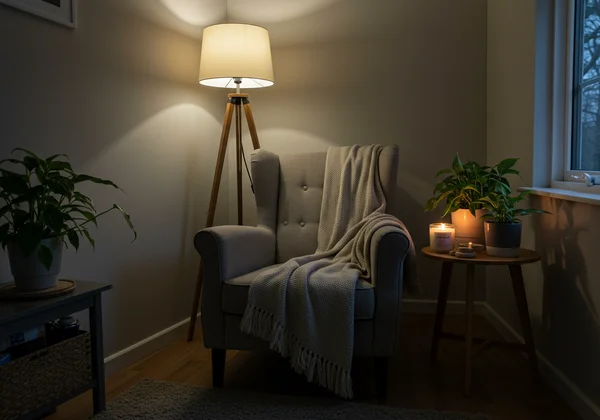Take the HSP Test & Manage Overwhelm: 10 Coping Strategies
August 17, 2025 | By Eleanor Reed
Do you ever feel like the world is too loud, too bright, or just... too much? If you find yourself easily drained by social events, startled by sudden noises, or deeply moved by art and music, you are not alone. This is a common experience for a Highly Sensitive Person (HSP), a term coined by psychologist Dr. Elaine N. Aron. If you've ever asked yourself, am I a highly sensitive person?, you might be on the verge of a profound self-discovery. Feeling HSP overwhelm doesn't have to be your default state.
This guide explores 10 practical coping strategies, grounded in psychology, to help you manage sensory overload and reclaim your calm. Understanding this innate trait is the first step toward transforming it from a source of stress into a remarkable strength. Ready to find your balance? Start by discovering your sensitivity level with our free HSP Test.
Understanding HSP Overwhelm and Burnout
Before we dive into solutions, it's crucial to understand why you feel this way. HSP overwhelm isn't a sign of weakness; it's a physiological response from a finely tuned nervous system. This trait, known scientifically as Sensory Processing Sensitivity (SPS), is found in 15-20% of the population. It means your brain processes information and stimuli more deeply than others.
What Causes Sensory Overload in HSPs?
The key to understanding sensory overload lies in the "Depth of processing" aspect of the HSP trait. Your brain doesn't just notice the bright lights, the ambient chatter, and the complex emotions of people in a room—it actively works to process and make sense of all of it simultaneously. This deep processing is a superpower that fuels creativity, empathy, and intuition. However, in a stimulating environment, it can quickly lead to your system becoming overtaxed, resulting in that all-too-familiar feeling of being overwhelmed and needing to escape.

The Link Between Overstimulation and Emotional Exhaustion
Constant overstimulation inevitably leads to emotional exhaustion. When your brain is working overtime to manage external stimuli, it has fewer resources left to regulate your own emotions. This is why a busy day at work can leave you feeling irritable or weepy for no apparent reason. It’s not just in your head; it’s a genuine state of mental and physical depletion. Recognizing this connection is validating and empowers you to proactively manage your energy before burnout sets in.
10 Essential HSP Coping Strategies to Thrive
Living well as an HSP is not about building thicker skin but about creating a life that honors your sensitive nature. These HSP coping strategies are designed to help you not just survive, but thrive.
1. Create a "Low-Stimulus" Sanctuary Space
Your home should be your haven. Designate a specific corner, room, or even just a comfortable chair as your personal sanctuary. Fill this quiet space with things that calm your nervous system: soft blankets, dimmable lighting, calming scents like lavender, and perhaps some plants. This is your go-to spot to decompress after a long day, allowing your mind to reset away from the world's demands.

2. Master the Art of the Mindful Pause
When you feel the wave of overwhelm building, a mindful pause can be your anchor. You don't need a 30-minute meditation session; just one minute can make a difference. Close your eyes, take three deep, slow breaths, and focus on the sensation of your feet on the floor. This simple practice of mindfulness for HSPs interrupts the stress cycle and brings you back to the present moment, giving your nervous system a much-needed break.
3. Set Empathetic Yet Firm Boundaries
Due to high empathy, many HSPs find themselves putting others' needs before their own. Learning how to set empathetic yet firm boundaries is a critical act of self-preservation. You can be both kind and clear. For example, instead of a blunt "no," try saying, "I'd love to help, but my plate is full right now. Can we reconnect next week?" This approach respects your limits while honoring your relationships.
4. Schedule Deliberate Downtime
For an HSP, downtime isn't a luxury; it's a necessity. Just as you schedule meetings and appointments, you must schedule unstructured alone time into your calendar. This is when your brain can process the backlog of information it has absorbed. Honoring your HSP need for alone time prevents you from reaching a crisis point of overwhelm and ensures you have the energy for the things that matter most.
5. Manage Your Energy, Not Just Your Time
Productivity gurus talk about time management, but for HSPs, energy management is far more crucial. Notice what activities drain you and which ones replenish you. A crowded mall might deplete your energy in 30 minutes, while a quiet walk in the park could recharge it. Structure your days and weeks to balance energy-draining tasks with restorative ones.
6. Choose Your Social Engagements Wisely
You don't have to attend every party or social gathering. When it comes to socializing as an HSP, quality trumps quantity. Opt for smaller groups or one-on-one interactions where you can have meaningful conversations. If you must attend a large event, have an exit strategy. Giving yourself permission to leave when you're done, without guilt, is incredibly empowering.
7. Use Noise-Canceling Headphones as a Tool
In a world that's often too loud, noise-canceling headphones are one of the most effective sensory tools for an HSP. Use them during your commute, in an open-plan office, or even at the grocery store. Reducing auditory input can dramatically lower your overall stimulation level, preserving your mental energy and preventing sensory overload before it starts.
8. Practice Self-Compassion After Overwhelm
Even with the best strategies, moments of overwhelm will still happen. When they do, the most important thing is to be kind to yourself. Instead of self-criticism ("Why can't I handle this?"), practice self-compassion. Acknowledge your feelings without judgment: "This is a lot right now, and it's okay to feel overwhelmed." This approach to self-care for HSPs fosters resilience and helps you recover more quickly.
9. Connect with Nature to Reset Your System
Nature is a powerful antidote to overstimulation. The gentle, fractal patterns of leaves, the sound of wind, and the feeling of sun on your skin are naturally calming for the HSP nervous system. Even a short 15-minute walk in a local park can work wonders. Make regular nature therapy a non-negotiable part of your routine to ground yourself and discharge excess stress.

10. Understand Your Unique Triggers
The most effective strategy of all is self-knowledge. What triggers your overwhelm might be different from another HSP's. Is it fluorescent lighting? Strong smells? Crowds? Understanding your unique HSP triggers allows you to anticipate challenges and create proactive strategies. The foundational step to gaining this knowledge is confirming your trait through a reliable hsp personality test.
Find Your Calm: Start by Understanding Your Trait
These coping strategies are your toolkit for a calmer life. But to use them effectively, you first need to understand the blueprint of your nervous system. Confirming you're an HSP isn't about getting a label; it's about gaining a user manual for yourself—one that unlocks self-acceptance and empowers you to stop fighting your nature and start working with it.
Ready to swap constant overwhelm for confident clarity? Take our free HSP test today. Based on Dr. Elaine N. Aron's research, it’s the definitive first step. For even deeper insights, you can unlock a personalized AI report that reveals your unique strengths and a clear action plan for a more balanced life.
Disclaimer: This article is for informational purposes only and does not constitute medical advice. The test is a preliminary assessment tool, not a clinical diagnosis. Please consult a qualified professional for any health concerns.
Frequently Asked Questions About HSP and Overwhelm
How do you confirm HSP?
While self-reflection is a great start, the most reliable way to confirm the HSP trait is by using a well-researched assessment. The HSP scale developed by Dr. Elaine N. Aron is the gold standard. You can take a free version of this test to see how you score on the key characteristics of high sensitivity and gain immediate insight into your personality.
What are the signs of a highly sensitive person?
The core signs of a highly sensitive person are summarized by the acronym DOES: Depth of processing (thinking deeply about things), Overstimulation (getting easily overwhelmed by stimuli), Emotional responsiveness (feeling emotions intensely, both positive and negative), and Sensitive to subtleties (noticing small details others miss). If these traits resonate with you, it's highly likely you are an HSP.
Do highly sensitive people need more sleep?
Yes, many HSPs find they need more sleep than their less-sensitive peers. Because their brains process information so deeply throughout the day, sleep is a crucial time for mental sorting and recovery. If you're an HSP, prioritizing 8-9 hours of quality sleep can be one of the most effective ways to prevent daily overwhelm and maintain emotional equilibrium.